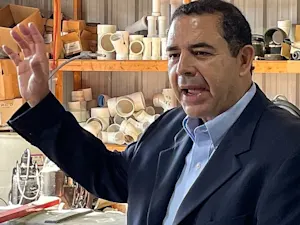
DeSantis Declares 'No Safe Space' for Protesters
DHS and Florida Governor Ron DeSantis Press Conference, 2025. Photo courtesy of CBP Photography. Public domain.
They were planning a series of peaceful protests. Then Florida's governor said it was fine to run them over.
As the military planned a large-scale parade for Washington and with over 2,000 protests set to erupt nationwide under the "No Kings" banner, Governor Ron DeSantis made a declaration that sent chills across civil rights groups and set social media ablaze. Speaking on "The Rubin Report," the Florida leader didn't mince words — if you feel threatened while driving and protesters are in your way, he said, hitting them with your car is their fault, not yours, according to Newsweek.
This isn't political hyperbole or a stray soundbite. It's the Florida governor's interpretation of state law, entirely in line with HB 1, the 2021 "anti-riot" legislation critics say criminalizes protest and emboldens violent responses to civil unrest.
Florida's Road Rules: Protesters Beware
"If you are driving on one of those streets and a mob comes and surrounds your vehicle and threatens you, you have a right to flee for your safety," DeSantis told podcast host Dave Rubin, according to NBC Miami. "And so if you drive off and you hit one of these people, that’s their fault for impinging on you."
The statement came just days before the coordinated "No Kings" protests, demonstrations challenging President Donald Trump's second-term military spectacle and ICE's aggressive immigration enforcement, were set to unfold across all 50 states.
But DeSantis' message wasn't just rhetorical. In a separate Fox News interview, he warned that law enforcement and even the National Guard would be mobilized statewide to ensure protests didn't devolve into what he called "nonsense," according to the Tallahassee Democrat.
The Law, the Loophole, and the Line in the Sand
Florida's HB 1 doesn't explicitly say drivers can run over protesters. But it does provide civil immunity for injuries or deaths caused during an escape from what authorities deem a "riot" — even if the driver is the one doing the escaping, the Tallahassee Democrat explained.
In theory, this law is about protecting public safety. In practice, critics argue, it places the lives of demonstrators in the hands of motorists who may or may not be in real danger. "The right to use deadly force in Florida only occurs when you reasonably fear death or great bodily harm," Miami defense attorney Mark Eiglarsh told NBC Miami. "You don't get free rein to hit protesters just because they are around your vehicle."
That distinction matters — especially as tensions escalate between protesters and law enforcement.
From Chilling Rhetoric to Real-World Consequences
Brevard County Sheriff Wayne Ivey took the message further. At a press conference alongside Florida's Attorney General James Uthmeier, he warned, "If you throw a brick, a fire bomb, or point a gun at one of our deputies, we will be notifying your family where to collect your remains, because we will kill you, graveyard dead," as reported by the Tallahassee Democrat.
The ACLU slammed these statements as "violent and provocative," warning they could have a chilling effect on First Amendment rights, according to EL PAÍS.
The "No Kings" protests, organized by the 50501 Movement, explicitly aimed to be nonviolent. Organizers provided de-escalation training and urged participants not to bring weapons of any kind — even if legally permitted.
At the conclusion of the protests, almost all were confirmed to be peaceful, with a few exceptions in L.A. and Portland.
Fear in the Streets, Confusion in the Courts
Florida is not the only state where cars have become weapons in politically charged environments. Between May and October 2020, there were over 100 vehicle attacks on protesters nationwide — eight of them in Florida alone, according to multiple sources.
In 2017, James Alex Fields Jr. was sentenced to life in prison for using his car to murder Heather Heyer during the Charlottesville "Unite the Right" rally. His attempt to claim self-defense didn't hold up in court.
The difference now? In Florida, the governor seems to be saying that might not be the case anymore.
The Road Ahead
DeSantis' remarks mark a dangerous shift, not just in legal interpretation, but in how elected officials approach civil unrest. For supporters, it's a bold defense of public safety. For critics, it's a siren call to vigilantism.
As America braces for a summer of even more protests, one thing is clear: In Florida, the line between driver and demonstrator — safety and suppression — just got a whole lot blurrier.
References: Ron DeSantis Says Floridians Have Right to Hit Protesters With Cars | Is it legal to run over protesters in Florida? How to stay safe at 'No Kings' protests | Florida authorities threaten protesters: 'We're going to kill you.' | Ahead of 'No Kings' protests, DeSantis says Florida drivers can hit protesters to ‘flee for your safety' | No Kings: protests in the eye of the storm | 'No Kings' protests mostly peaceful; LA, Portland among exceptions






















